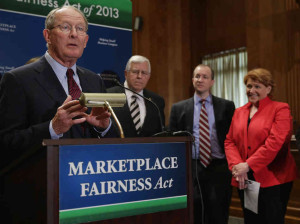Last month, the Senate passed the Marketplace Fairness Act (MFA),

which would force online businesses to collect and remit sales taxes to remote states. The bill is now under the purview of the House Judiciary Committee.
The arguments for and against the taxation of internet sales come from all directions:
- from states who contend they’re losing billions in sales tax revenues as a result of uncollected sales tax on internet sales;
- from on-line retailers who maintain that a 1992 Supreme Court decision prohibits states from imposing a sales tax collection requirement; and
- from the brick-and-mortar retailers who argue that traditional sales tax nexus rules puts them at a competitive disadvantage.
While it isn’t clear if the House will follow the lead of the Senate and pass the MFA, it’s still a good idea for clients who are e-commerce merchants to prepare themselves for changes in the tax laws.
“I think the best thing for businesses to do is really start the preparation and get ready for this, should it pass the House and become law,” said Carla Yrjanson, Vice President of Tax Research and Content for Indirect Tax at Thomson Reuters. “There are several key things that businesses can do to get ahead of the game on this. The first one is to determine the tax exposure that the particular business will have should this law go into effect. How much is at risk and how much is it going to impact the business?”
The law currently exempts online businesses with less than $1 million in annual U.S. remote sales, although businesses like eBay would like to see that threshold raised (see Senate Passes Internet Sales Tax Legislation).  “If the business is close to the threshold, then they should consider some options for complying with the regulations,” said Yrjanson in an interview Monday.
She sees a possibility for that threshold being raised to permit larger online businesses to be exempted. “I think that’s where that discussion has been,” she said. “It will be interesting to see where the threshold ends up. I think at this point, it’s safe to assume it’s $1 million. But who knows what’s going to happen? If a business is exceeding that threshold and they are utilizing an automated tax solution, they might have everything they need for this new law.”
Businesses may need to worry about being audited by a state tax authority if they don’t comply with the sales tax laws.
“I think audits are something that businesses really should be concerned about and are concerned about today,” said Yrjanson. “There have been a lot of changes with sales and use tax laws, even without the Marketplace Fairness Act. Putting that aside, there are continual changes with sales and use tax laws, and with the change comes the possibility of an audit. Having that reporting possibility in a state brings that possibility of an audit. With the Amazon laws and normal rate changes and product taxability changes and this potential Marketplace Fairness Act, the more jurisdictions you have to collect tax in, the more you have that audit exposure.”
NGAC will keep monitoring this potential legislation and keep you updated as necessary.
 which would force online businesses to collect and remit sales taxes to remote states. The bill is now under the purview of the House Judiciary Committee.
The arguments for and against the taxation of internet sales come from all directions:
which would force online businesses to collect and remit sales taxes to remote states. The bill is now under the purview of the House Judiciary Committee.
The arguments for and against the taxation of internet sales come from all directions: